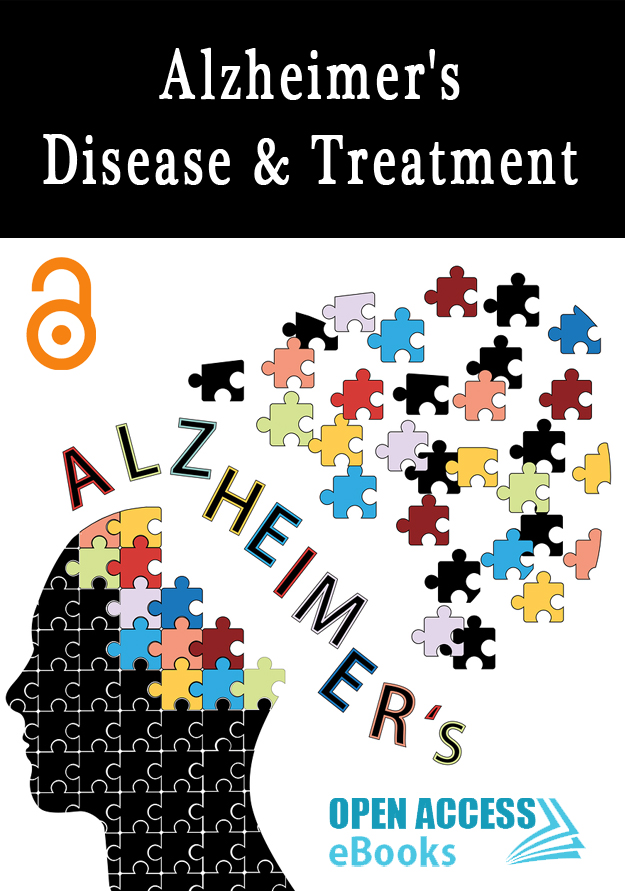List of Chapters
Therapeutic Strategies for the Treatment of Alzheimer's Disease-Recent Advances and Future Perspective
Author(s): Suganthy N*
Alzheimer's disease (AD) a progressive and fatal neurodegenerative disorder is considered as scourge of 21st century, as it acts as a biggest health challenge and socioeconomic burden for the developed countries. Neuropathological hallmarks of AD involves extracellular deposition of senile plaques composed of fibrillar β amyloid peptide (Aβ) in the synaptic junction and presence of neurofibrillary tangles (NFT) in the axon leading to impairment of neurotransmission causing neuronal death. AD is multifactorial disorder, with complex biochemical pathways leading to its pathogenesis; hence single targeted drugs will not be efficient for the treatment of AD. Current symptomatic treatment for AD includes cholinesterase inhibitors and N-methyl-D aspartate receptor antagonist, which are poorly effective for mild to moderate AD and also possess severe side effects.
Natural Products for Treatment of Alzheimer's Disease
Author(s): Maha Z. Rizk ; Hanan F. Aly*
Aging is a complex process accompanied by several changes, including shrinkage in human brain, in addition to changes in brain white matter. Loss of neurons and myelinated axons are supposed to be the cause of decrease in weight and volume of the aged brain. The common human age-related neurodegenerative disorders such as Alzheimer's disease (AD) andParkinson's diseases (PD) are characterized by the progressive loss of brain function and memory decline. It is well known that the risk to develop dementia causing diseases increases with chronological aging. Several studies indicated that the age-dependent changes at gene and protein expression level, are multifactorial as human brain aging could result from the combination of the normal decline of biological functions with environmental factors that contribute to defining disease risk of late-life brain disorders.
Alzheimer's Disease and Occupational Exposures: A Systematic Literature Review and Meta-Analyses
Author(s): Lars-Gunnar Gunnarsson* Lennart Bodin
Six systematic literature reviews together with meta-analyses have been published on the associations between Alzheimer's disease and occupational risk factors. Our meta-analyses were based only on studies fulfilling good standards of scientific quality. We scrutinized the 54 relevant original publications found using a checklist proposed by the MOOSE-group together with a new elaborated protocol. Thus our results are not hampered by bias from studies of lower scientific quality. Thirty publications fulfilled good scientific standards and were thus used in our meta-analyses. Exposures to electromagnetic fields were concerned in 12 publications.
Fruit Fly (Drosophila melanogaster): Aviable Model for Screening Tropical Functional Foods for Neuroprotective Properties
Author(s): Ganiyu Oboh*; Adedayo O Ademiluyi; Ayokunle O Ademosun; Opeyemi B Ogunsuyi; Folasade L Oladun
In the prevention of chronic disease such as neurodegenerative diseases, nutrition is critical; not just to meet nutritional requirements but more importantly to contribute to the total wellness of the consumer by either preventing and/or managing such disease conditions. This has further promoted the concept of functional foods and nutraceuticals. However, while several studies abound on the huge abundance and diversity of functional foods especially in tropical parts of the world, there is a still serious limitation to rapid and high throughput experimental screening for neuroprotective properties of several functional foods especially in developing nations.
Drug Targets and Therapeutic Approaches of Alzheimer's Disease
Author(s): Karthikeyan Muthusamy*; Lakshmanan Loganathan; Elavazhagan Palanivel; Prahashini Palanisamy
Dementia is an emerging global clinical complication and it is associated with a variety of distinct pathological and intellectual functions. Alzheimer's disease (AD) is major part (70%–80%) of the dementia. AD is a progressive multifarious neurodegenerative disorder which affects the routine life of the patients with several complications like memory loss and difficulty in communication skills. The pathophysiological conditions of AD are influenced by a variety of genetic and environmental factors. Effective management of AD and other types of dementia is essential for better healthy longevity of patients. In the past two decades, advances in the field of pathogenesis have enthused the research community for investigation of novel pharmacological therapeutics with known targets of the disease.
The Pivotal Role of Neuroinflammation in the Genesis and Evolution of Alzheimer’s Disease
Author(s): Belkhelfa M*; Beder N; Rafa H; Touil-Boukoffa C
Alzheimer’s disease (AD) is a neurodegenerative disease with progressive and irreversible clinical course. Without effective treatments, Alzheimer’s disease could reach epidemic proportions. This means that a global approach to the disease is based on the study of the interaction between three fundamental processes involved in neurodegeneration: neuroinflammation, amyloidogenesis and synaptic dysfunction.
